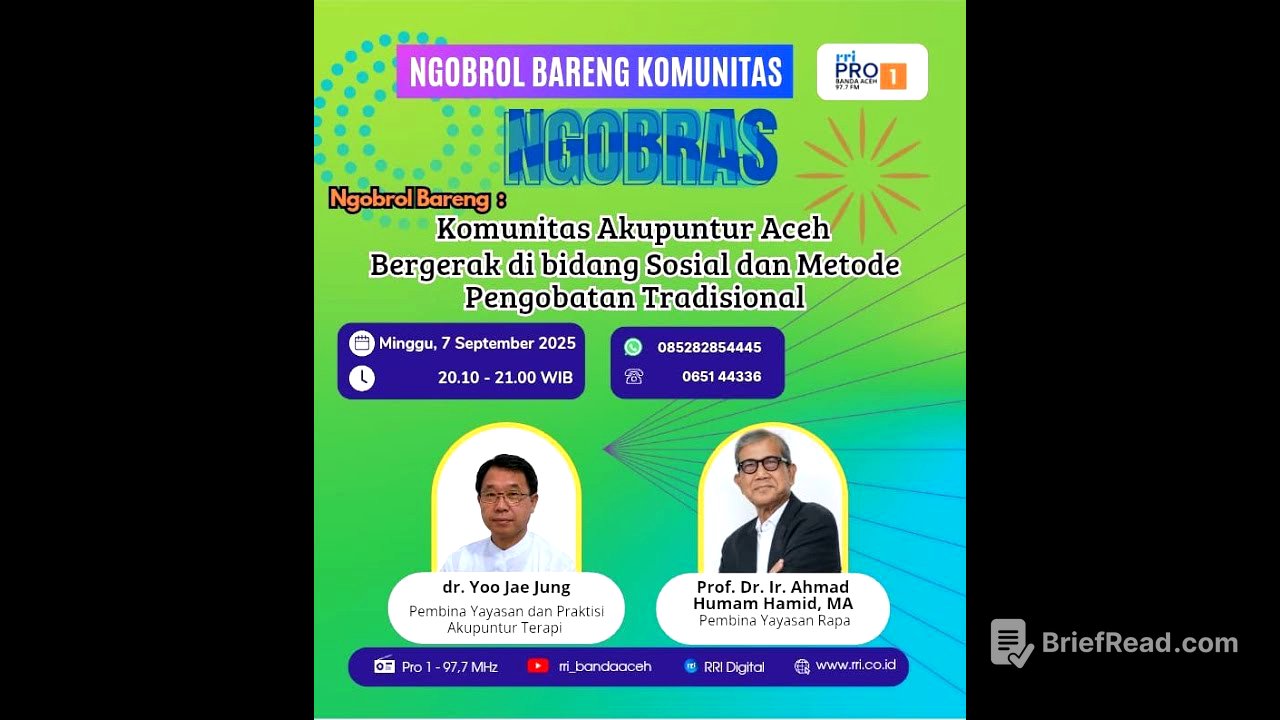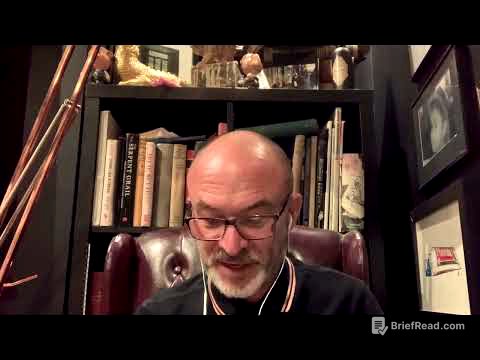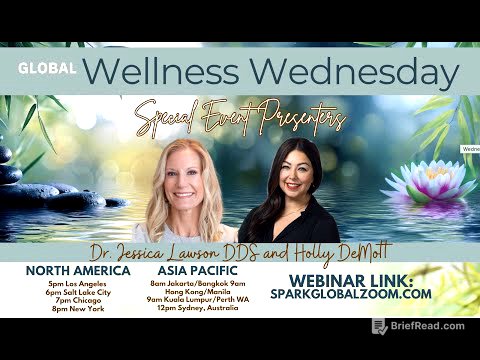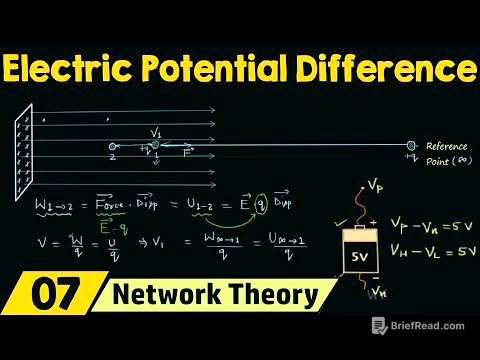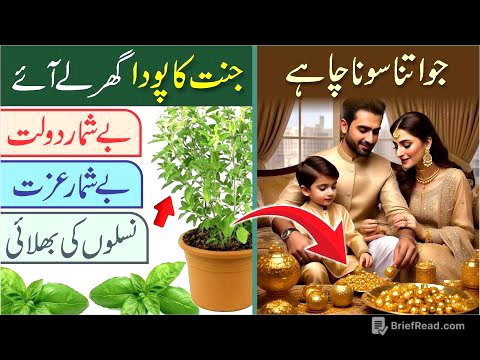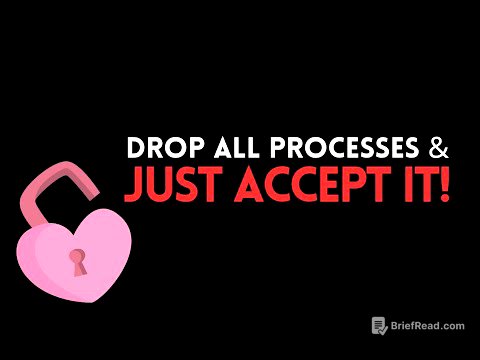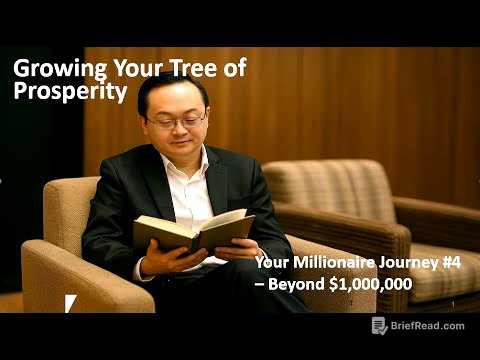TLDR;
This video features a discussion about the Aceh Acupuncture Community, its origins, role, and future. Dr. Yo Jijung, the founder of Foundations and Techniques for Therapy, and Mr. Ahmad Humam Hamid, the founder of the Rafa Foundation, share their insights on acupuncture as a traditional healing method and its integration with modern medicine. The conversation covers the challenges faced in promoting acupuncture, its benefits, and the importance of preserving traditional healing methods.
- The Aceh Acupuncture Community was founded to provide free acupuncture treatment to the Acehnese people, especially after the 2005 tsunami.
- Acupuncture is seen as a complementary approach to Western medicine, focusing on holistic and emotional aspects of health.
- The community aims to improve the quality of life for the Acehnese people through health services and social initiatives.
Introduction to the Aceh Acupuncture Community [0:49]
The host introduces the Ngopras program, featuring the Aceh Acupuncture Community. Dr. Yo Jijung, founder of Foundations and Techniques for Therapy, and Mr. Ahmad Humam Hamid, founder of the Rafa Foundation, are present as resource persons. The discussion will revolve around the Aceh Acupuncture Community and its activities.
The Origins and Motivation Behind the Aceh Acupuncture Community [2:32]
Dr. Yo Jijung explains that he first came to Aceh in March 2005 as part of an NGO from South Korea after the tsunami. He collaborated with an Indonesian human rights NGO to provide aid and opened a free clinic. Over time, he established the Aceh acupuncture community to treat patients, founding the Dawat Pasien Aceh Foundation (DPA). The clinic grew, serving many patients from various regions. In 2013, Dr. Yo decided to train local Acehnese individuals, leading to the establishment of a training school and later an academy to continue acupuncture education.
The Role of Acupuncture in Traditional Medicine [6:49]
Dr. Yo discusses the role of acupuncture in traditional medicine, noting that when he first started, the Acehnese people had little knowledge of acupuncture treatment. Over the past 20 years, awareness has grown, with people understanding the difference between Western medicine (analytical and rational) and traditional medicine (holistic and emotional). He believes acupuncture aligns well with Acehnese culture, which values togetherness, balance, and emotional resilience. Dr. Yo hopes that graduates from the Akungtu Academy will play a significant role in health services for the Acehnese community.
Mr. Humam's Personal Experience with Acupuncture [9:42]
Mr. Humam shares his personal experience with acupuncture, explaining that he sought treatment for sleep problems after conventional medicine failed. He found relief through acupuncture with Mr. Yusuf, experiencing improved sleep and reduced spinal pain. Mr. Humam learned that acupuncture stimulates the release of endorphin, serotonin, and dopamine, which promote happiness and well-being. Inspired by these benefits and Mr. Yusuf's dedication, he joined the Aceh acupuncture community to help others.
The Integration of Modern Science and Traditional Healing Methods [16:39]
Mr. Humam discusses the integration of modern science and traditional healing methods. He notes that in China, hospitals often have both modern and acupuncture clinics. He mentions efforts in Europe and America to integrate acupuncture for conditions like cancer pain relief. Mr. Humam emphasizes that he is a consumer who is trying to help the campaign to benefit the community.
Challenges in Promoting Acupuncture as an Alternative Healing Method [18:09]
Dr. Yo discusses the challenges in promoting acupuncture as an alternative healing method in Indonesia. He points out that in Korea and China, acupuncture education is extensive (6-year programs), and acupuncture is considered a main pillar of public health, not just an alternative treatment. In Indonesia, acupuncture colleges lack in-depth theory and advanced degree programs. Dr. Yo hopes that Indonesian acupuncture colleges will address these issues and that acupuncture services will expand across Aceh, becoming an integral part of people's lives.
Evolution of Acupuncture Techniques and Tools [21:47]
Dr. Yo explains the differences between acupuncture techniques and tools of the past and present. Needles used to be thick and long, causing pain and potential danger. Modern needles are thin, short, and coated to reduce pain and ensure safety. While modern needles may have slightly reduced function compared to the past, the emphasis is on safety and patient comfort.
The Role of the Community in Improving Quality of Life [25:42]
Mr. Humam discusses the role of the Aceh acupuncture community in improving the quality of life for the Acehnese people. He highlights Mr. Yusuf's volunteer work and the community's efforts to provide services at various locations, including free clinics. Mr. Humam emphasizes the importance of introducing acupuncture to the community and overcoming initial skepticism.
The Importance of Preserving and Developing Traditional Healing Methods [29:10]
Mr. Humam emphasizes the importance of preserving and developing traditional healing methods. He notes that many traditional practices, such as drinking bandrek (a traditional Indonesian beverage), have proven health benefits. Mr. Humam believes that traditional medicine, like acupuncture, offers advantages that modern medicine cannot always provide, such as preventing colds and reducing bloating. He highlights the growing popularity of TCM acupuncture clinics in Europe and America.
Training and Certification Process for Acupuncturists [33:03]
Dr. Yo explains the training and certification process for acupuncturists in the community. The academy has adopted the curriculum of Solo Health Polytechnic, a benchmark for Indonesian educational standards. Dr. Yo aims to reform the curriculum and teaching methods, drawing from universities in Korea and China. The focus is on building a retraining system for lecturers and providing clinical practice opportunities for students. Due to the lack of local clinical practice options, students conduct clinical practice at the foundation's three locations, ensuring hands-on experience and skill development.
Closing Statements and Messages to the Community [39:16]
In closing statements, Dr. Yo expresses his hope that those who join the acupuncture field, especially Acehnese children from villages, can contribute to the health of their communities. Mr. Humam praises Mr. Yusuf's noble effort in campaigning for alternative traditional Chinese medicine and emphasizes the importance of integrating it with modern medicine to provide comprehensive healthcare services.
